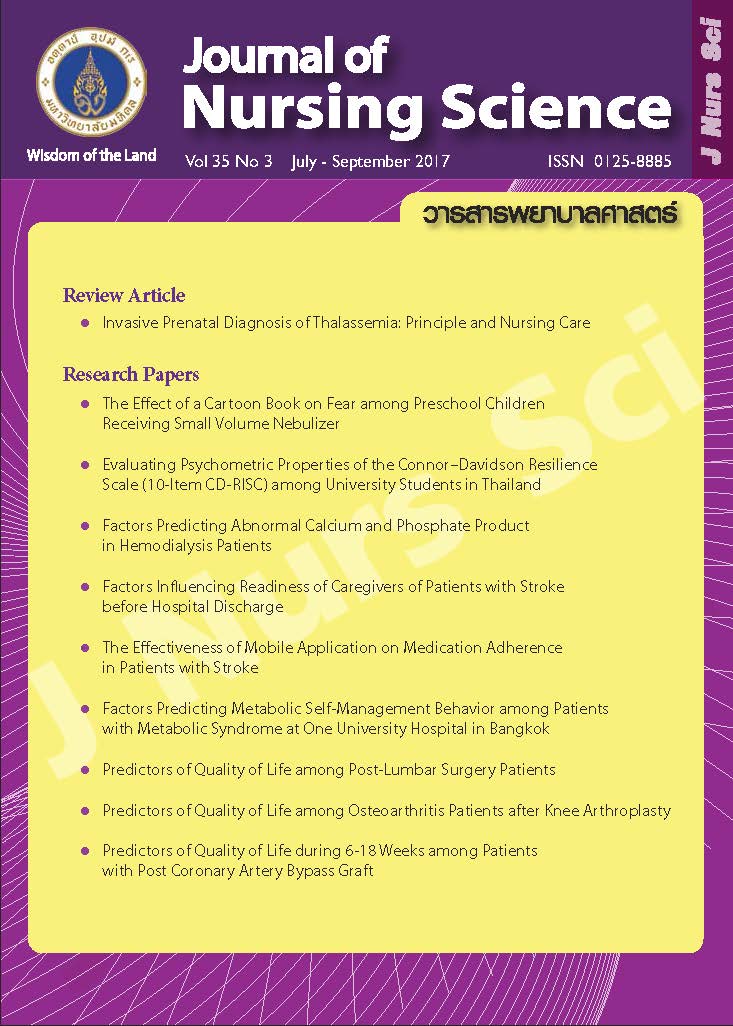Factors Predicting Metabolic Self-management Behavior among Patients with Metabolic Syndrome at One University Hospital in Bangkok ปัจจัยทำนายพฤติกรรมการจัดการภาวะอ้วนลงพุงด้วยตนเอง ของผู้ป่วยอ้วนลงพุงในโรงพยาบาลมหาวิทยาลัยแห่งหนึ่งในกรุงเทพมหานคร
Main Article Content
Abstract
Purpose: To examine the predicting power of age, health perception, self-efficacy, and patient-provider communication, to self-management behaviors of patients with metabolic syndrome.
Design: Predictive design.
Methods: The study sample consisted of 200 patients with metabolic syndrome who received treatment at one university hospital in Bangkok. Data were collected using 5 questionnaires: 1) personal record form, 2) health-perception, 3) self-efficacy, 4) patient-provider communication, and 5) self-management behaviors. Data were analyzed using descriptive statistics and multiple regression analysis.
Main findings: The findings revealed that scores of diabetes self-management of the subjects were at a moderate level. Age, health perception, self-efficacy, and patient-provider communication could account for 59% of variance in metabolic self-management behaviors (R2 = .59, F =14.12, p < .05). Only two of the predictors: self-efficacy and patient-provider communication significantly predicted metabolic self-management behaviors. Self-efficacy has more influence on metabolic self-management (ß = .67, p < .05), follow by patient-provider communication (ß = .19 p < .05).
Conclusion and recommendations: Based on the study findings, it is recommended that activities or programs to promote self-efficacy and patient-provider communication for patients with metabolic syndrome should be developed.
บทคัดย่อ
วัตถุประสงค์: เพื่อศึกษาอำนาจการทำนายของอายุ การรับรู้ภาวะสุขภาพ สมรรถนะแห่งตน และการสื่อสารระหว่างผู้ป่วยกับเจ้าหน้าที่สุขภาพ ต่อพฤติกรรมการจัดการภาวะอ้วนลงพุงด้วยตนเอง
รูปแบบการวิจัย: การศึกษาแบบหาอำนาจการทำนาย
วิธีดำเนินการวิจัย: กลุ่มตัวอย่าง คือ ผู้ป่วยอ้วนลงพุง จำนวน 200 คน ที่มารับบริการที่แผนกผู้ป่วยนอก โรงพยาบาลมหาวิทยาลัยแห่งหนึ่งในกรุงเทพมหานคร เก็บรวบรวมข้อมูลโดยใช้แบบสอบถาม จำนวน 5 ชุด ได้แก่ แบบสอบถามข้อมูลทั่วไป แบบสอบถามการรับรู้ภาวะสุขภาพ แบบสอบถามสมรรถนะแห่งตน แบบสอบถามการสื่อสารระหว่างผู้ป่วยกับเจ้าหน้าที่สุขภาพ และแบบสอบถามพฤติกรรมการจัดการภาวะอ้วนลงพุงด้วยตนเอง วิเคราะห์ข้อมูลสถิติเชิงบรรยายและสัมประสิทธิ์ถดถอยพหุคูณแบบขั้นตอน
ผลการวิจัย: ผลการศึกษาพบว่า อายุ การรับรู้ภาวะสุขภาพ สมรรถนะแห่งตน และการสื่อสารระหว่างผู้ป่วยกับเจ้าหน้าที่สุขภาพร่วมกันทำนายพฤติกรรมการจัดการภาวะอ้วนลงพุงด้วยตนเองของผู้ป่วยอ้วนลงพุงได้ร้อยละ 59 (R2 = .59, F = 14.12, p < .05) มี 2 ปัจจัยที่สามารถทำนายพฤติกรรมการจัดการภาวะอ้วนลงพุงด้วยตนเอง ได้แก่ สมรรถนะแห่งตน และการสื่อสารระหว่างผู้ป่วยกับเจ้าหน้าที่สุขภาพ โดยพบว่าสมรรถนะแห่งตนเป็นปัจจัยที่ทำนายพฤติกรรมการจัดการภาวะอ้วนลงพุงด้วยตนเองของผู้ป่วยอ้วนลงพุงแผนกผู้ป่วยนอกได้สูงสุด (ß = .67, p < .05) รองลงมา คือ การสื่อสารระหว่างผู้ป่วยกับเจ้าหน้าที่สุขภาพ (ß = .19, p < .05)
สรุปและข้อเสนอแนะ: จากผลการวิจัยควรจัดกิจกรรมหรือพัฒนาโปรแกรมการดูแลผู้ป่วยอ้วนลงพุงที่ส่งเสริมให้ผู้ป่วยมีสมรรถนะแห่งตน และส่งเสริมให้มีการสื่อสารระหว่างผู้ป่วยกับเจ้าหน้าที่สุขภาพให้มากขึ้น เพื่อส่งเสริมให้ผู้ป่วยมีพฤติกรรมการจัดการภาวะอ้วนลงพุงด้วยตนเองที่เหมาะสมต่อไป
Article Details
Copyright Notice: Nursing Science Journal of Thailand has exclusive rights to publish and distribute the manuscript and all contents therein. Without the journal’s permission, the dissemination of the manuscript in another journal or online, and the reproduction of the manuscript for non-educational purpose are prohibited.

Disclaimer: The opinion expressed and figures provided in this journal, NSJT, are the sole responsibility of the authors. The editorial board bears no responsibility in this regard.
References
2. Nokdee C. Thais are the second obesity of ASEAN [Internet]. Bangkok: Thai Health Promotion Foundation; 2014 [cited 2017 Jun 1]. Available from: http://www.thaihealth.or.th/Content/24745- (in Thai).
3. International Health Policy Program, Thailand, Ministry of Health. Disease situation report NCDs No.2 “kick off to the goals” [Internet]. Nonthaburi: International Health Policy Program, Thailand; 2014 [cited 2017 Jun 1]. Available from: http://www.dmthai.org/sites/default/files/ncd_nhes_v_2016.pdf (in Thai).
4. Thaman RG, Arora GP. Metabolic syndrome: definition and pathophysiology– the discussion goes on! Journal of Physiology and Pharmacology Advances. 2013;3(3):48-56.
5. Pradidthaprecha A, Muktabhant B. Dietary factors affecting type 2 diabetes mellitus in people of Naklang District, Nongbualumpho Province. Khon Kaen University Research Journal (Graduate Studies). 2012;12(3):61-9. (in Thai).
6. Charoenchoketavee C, Rawdaree R, Chotnoparatpat P, Thaipisuttikul T. Metabolic syndrome in personnel of Faculty of Medicine Vajira Hospital and their cardiovascular risks. Vajira Medical Journal. 2012;56(3):183-91. (in Thai).
7. Creer TL. Self-management of chronic illness In: Boekaerts M, Printrich PR, Zeidner M, editors. Handbook of self-regulation. San Diego, CA: Academic Press; 2000. p.601-29.
8. Phetarvut S, Watthayu N, Suwonnaroop N. Factors predicting diabetes self-management behavior among patients with diabetes mellitus type 2. Journal of Nursing Science. 2011;29(4):18-26. (in Thai).
9. Chaiwong N, Duongpaeng S, Masingboon K. Factors influencing self-management behaviors among acute myocardial infarction (AMI) patients. Thai Pharmaceutical and Health Science Journal. 2014;9(3):112-9. (in Thai).
10. Ardkhitkarn S, Pothiban L, Lasuka D. Self-management behaviors and predicting factors in elders with end stage renal disease undergoing continuous ambulatory peritoneal dialysis. Nursing Journal. 2013;40 Suppl 2:22-32. (in Thai).
11. Orem DE. Nursing concepts of practice. St. Louis: Mosby Year Book. 2001.
12. Broasbent E, Petrie KJ, Main J, Weinman J. The brief illness perception questionnaire.
J Psychosom Res. 2006;60(6):631-7.
13. Suriart C, Rutchanagul P, Thongbai W. Health perceptions, health behaviors and health service needs among inmates with metabolic disorders. Ramathibodi Nursing Journal. 2014;20(3):372-87. (in Thai).
14. Jariyasakulwong P, Charoenkitkarn W, Pinyopasakul W, Sriprasong S, Roubsanthisuk W. Factors influencing on health promoting behaviors in young adults with hypertension. Princess of Naradhiwas University Journal. 2015;7(3):26-36. (in Thai).
15. Bandura A. Self-efficacy: the exercise of control. New York: W.H. Freeman and Company; 1997.
16. Mishali M, Omer H, Heymann AD. The impact of measuring self-efficacy in patients with diabetes. Fam Pract. 2011;28(1):82-7.
17. Wattana C. Self-management support: strategies for promoting disease control. Journal of Phrapokklao Nursing College. 2015;26 Suppl 1:117-27. (in Thai).
18. Ryan P, Sawin KJ. The individual and family self-management theory: background and perspectives on context, process, and outcomes. Nurs Outlook. 2009;57(4):217-25.
19. Lo SW, Chair SY, Lee FK. Factors associated with health-promoting behavior of people with or at high risk of metabolic syndrome: based on the health belief model. Appl Nurs Res. 2015;28(2):197-201.
20. Sukpitak Y. Empowerment technique for self-management of diabetes patients in accordance with the community life style. Journal of Health Science. 2014;23(4):649-58. (in Thai).
21. Sujamnong S, Therawiwat M, Imamee N. Factors related to self-management of hypertensive patients, Taladkwan District health promotion hospital, Nonthaburi Province. Journal of Boromarajonani College of Nursing, Bangkok. 2013;29(2):21-30. (in Thai).
22. Klinwichit W, Piriyapun P, Inchai P. Health status, health perception, health promotion behavior and social support of pre-diabetic and metabolic syndrome in students: Burapha University. Journal of Nursing and Education. 2010;3(2):86-98. (in Thai).


